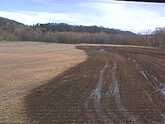CONSERVATION CORNER
A weekly blog for all things conservation
 An Excerpt from Pennsylvania’s Nutrient Management Program Nutrient management traditionally has been concerned with optimizing the economic returns from nutrients used to produce a crop. More recently, nutrient management also has begun to address ways to minimize the negative impact of nutrients on the environment. Programs such as the Chesapeake Bay Program and the Nutrient Management Act in Pennsylvania have focused attention on improving nutrient management on Commonwealth farms. The environmental problems associated with nutrients can come from animal manure and commercial fertilizers used on farms. Applying nutrients in excess of crop needs or at the wrong time, or handling it improperly may release nutrients into the air or water, where they no longer contribute to crop production and may act as pollutants. The leaching of nitrogen through the soil can raise groundwater nitrate levels. In addition, runoff and erosion may increase nitrogen and phosphorus levels in surface waters, which can lead to eutrophication and related problems such as algae scums, odors, and loss of fish populations. Good nutrient management planning can help to avoid some of these problems.
Nutrient management plans are not new. All farmers have a plan for using the manure produced by their animals. In many cases, however, this plan is very informal and addresses only manure disposal and possibly the crop response to the manure nutrients; environmental concerns usually are not addressed. Changing regulations now require farmers to implement more formal nutrient management plans that address environmental issues. A basic manure management plan can be completed by farm operators to meet Pennsylvania’s requirements. Some farms may want or need a more complete nutrient management plan which would include the following:
While all manure or nutrient management plans will contain the same basic elements, the actual plans themselves will take on many forms. Pennsylvania requires that all farms document these plans in writing. Many farms ask their local conservation district for help developing these plans. The Bradford County Conservation District is committed to helping people manage resources wisely. You can visit the Bradford County Conservation District at 200 Lake Rd in Wysox across from the Wysox Fire Hall. Contact us at (570) 485-3144 or visit our web page at www.bccdpa.com.
0 Comments
Leave a Reply. |
AuthorsVarious staff at the Bradford County Conservation District Archives
July 2024
Categories
All
|
|
Bradford County Conservation District
Stoll Natural Resource Center 200 Lake Road, Suite E | Towanda PA 18848 Phone: (570)-485-3144 |
